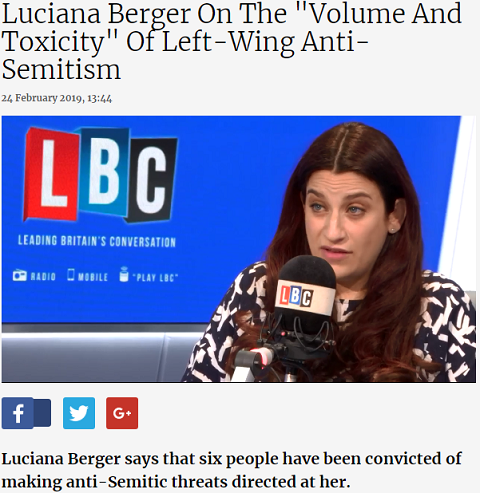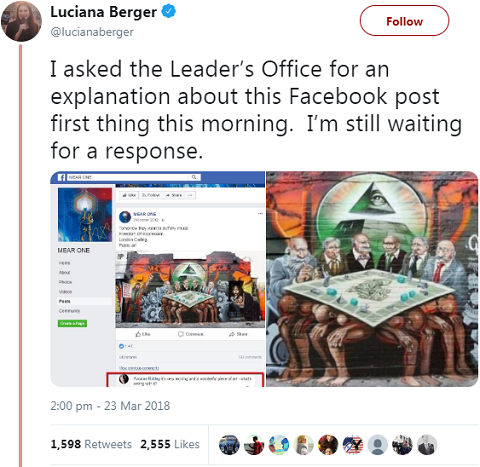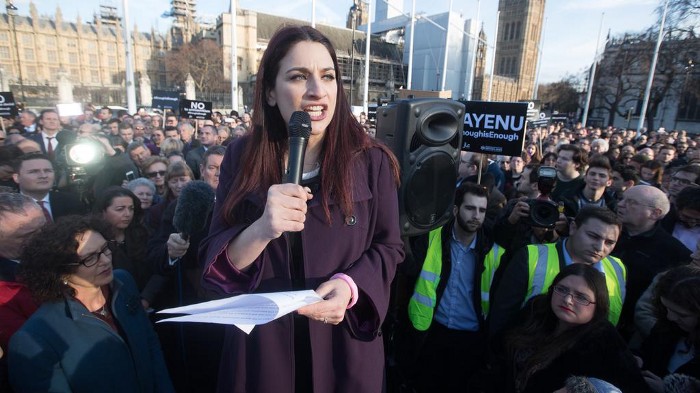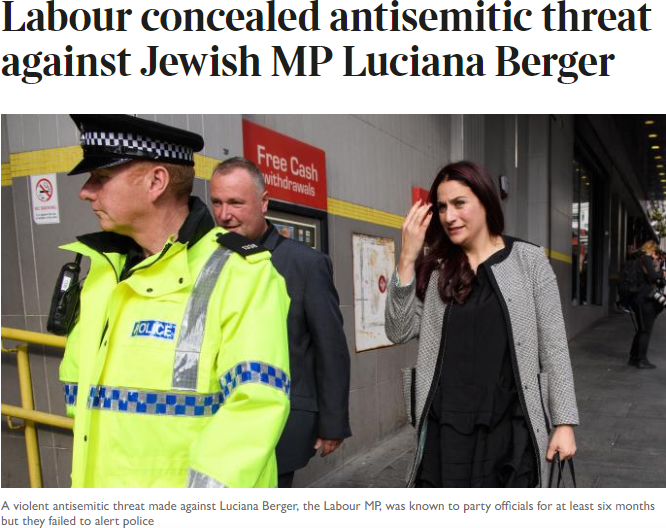Has the Labour left subjected Luciana Berger to hatespeak and death threats?
Matt Carr recently published an excellent article (“Are you or have you ever been an antisemite?”) on his Infernal Machine blog in which he patiently took apart the apparently never ending and still escalating moral panic over the so-called “antisemitism crisis” in the Labour Party. In circumstances where otherwise sensible liberal journalists have been swept away by the ongoing witch-hunting hysteria, it was a relief to find an article on the subject by a writer who retains a respect for empirical evidence and a capacity for rational thought.
Matt Carr did recognise that genuine antisemitism can be found on the left, for example when opposition to the crimes committed by the state of Israel crosses over into hostility towards the Jewish people in whose name it claims to be acting, or in the form of “‘tropes’, about ‘zionazis’, Rothschilds, international banking conspiracies, undue Jewish influence over domestic politics etc”. He was right about that.
However, he also gave credence to dubious claims that Luciana Berger, who broke from the Labour Party last month with a disparate bunch of rightwing malcontents to found the new Independent Group, had been the victim of racist abuse and threats of violence from the Labour left. “At its most extreme”, he wrote, “leftwing antisemitism may take the form of the vicious hatespeak and death threats directed at Jewish MPs such as Luciana Berger.”
When I asked Matt what evidence he had to back up the claim that the former Labour MP had been subjected to vicious hatespeak and death threats from leftwingers, he replied: “According to Berger two of the six people convicted of sending death threats were leftwing.” Apparently this story of leftwingers threatening Berger has now become accepted wisdom, even among those who otherwise express a healthy scepticism towards the prevailing narrative about antisemitism in the Labour Party. So it’s worth subjecting the story to a critical assessment.
 A major cause of the confusion is that Berger has consistently, and presumably intentionally, blurred the distinction between the abuse she has received from the left and from the far right, the effect of which has been to associate leftwingers with crimes that were in fact committed by fascists.
A major cause of the confusion is that Berger has consistently, and presumably intentionally, blurred the distinction between the abuse she has received from the left and from the far right, the effect of which has been to associate leftwingers with crimes that were in fact committed by fascists.
For example, in a ridiculously softball interview on LBC radio last month, Berger’s personal friend and anti-Corbyn Labour “centrist” Ayesha Hazarika prompted her: “Tell our listeners. A number of people have actually gone to prison for race hate against you. How many people have been convicted?” In reply, Berger stated that “six people have been convicted of antisemitic threats and abuse against me … four of which have come from the far right and two of which have come from the left”. She and Hazarika then proceeded to ignore the far-right cases and concentrate on discussing the horrors of leftwing antisemitism.
There are in fact three people who have actually gone to prison after being convicted of race hate crimes against Berger, not one of whom is a leftwinger. They are Garron Helm (who received a four-week sentence in October 2014), Joshua Bonehill-Paine (two years in January 2016) and John Nimmo (two years and three months in February 2017). All of them were active fascists.
It was the far-right cases that involved threats against Berger. In a sickening endorsement of Nazi mass murder, Garron Helm tweeted a photo of her with a yellow star superimposed on her forehead accompanied by the hashtag “Hitler was right”. John Nimmo issued explicit death threats against Berger, sending her a picture of a knife, warning her to “watch your back, Jewish scum” and declaring that “you will get it like Jo Cox”.
A fourth fascist named Jack Coulson (who was sentenced to four years and eight months last July) was in fact convicted of a terrorist offence, but the police investigation into his far-right activities was initiated by an allegation that he had verbally threatened to kill Berger, reportedly saying he would would “get the bitch” and “put two bullets in the back of her head”.
In her LBC interview Berger gave no information about the two instances in which leftwingers had been supposedly been “convicted of antisemitic threats and abuse” against her, apart from saying that one court case was from the end of last year and the other from 2013. Let us examine those cases in more detail.
Last December a Corbyn supporter and former Labour Party member named Nick Nelson did receive a 20-week suspended prison sentence for sending abusive emails to Berger in which he described her as a “vile useless Tory cunt”. Obviously this language was totally unacceptable (though not much more so, I would say, than denouncing Jeremy Corbyn to his face as “a fucking antisemite and a racist”, or shouting at Ken Livingstone that he’s “a fucking disgrace” and “a Nazi apologist”). But there were certainly no death threats involved, nor did the prosecution claim that the abuse was antisemitic. Nelson wasn’t charged with a racially aggravated offence but with “harassment without violence”. He is reportedly Jewish himself and one of his complaints against Berger was that she was “using Judaism as a weapon” against the party.
In the second case where a leftwinger was convicted, a Merseyside music promoter named Philip Hayes subjected Berger to abuse after an argument about Israel’s policy in Gaza. In that instance the abuse was definitely antisemitic. Hayes drunkenly told Berger that he hated Jews and he pleaded guilty to a racially aggravated public order offence, receiving a £120 fine. Again, however, there were no death threats involved, or indeed any threat of violence at all. Berger now says she believes Hayes was a member of the Labour Party, although nobody mentioned that at the time. On top of which, the incident took place back in November 2012, long before Corbyn’s election as Labour leader and the outbreak of antisemitism in the party that supposedly followed his victory.
So, of the two leftwingers who according to Berger were among those convicted of “antisemitic threats and abuse” against her, neither was charged with threatening behaviour and only one of the cases (which dates from over six years ago) involved antisemitism. Neither case was serious enough to merit a custodial sentence. Clearly there is a distinction to be made between the leftwing cases of abuse against Berger, reprehensible though they are, and the much more serious far-right ones. Her wilful failure to make such a distinction explains why Matt Carr could cite Berger as the source for his mistaken claim that “two of the six people convicted of sending death threats were leftwing”.
 There was a time when Berger was quite clear about where the threat of antisemitism came from. In March 2016, on the eve of attending a conference organised by the Inter-parliamentary Coalition for Combating Antisemitism in Berlin, she tweeted screenshots of the vile antisemitic online abuse she had received, commenting that this was why the ICCA conference was so necessary. She tweeted the same screenshots again the following month as an illustration of “what Antisemitism in 2016 looks like”. All of this abuse was from the far right, none from the left.
There was a time when Berger was quite clear about where the threat of antisemitism came from. In March 2016, on the eve of attending a conference organised by the Inter-parliamentary Coalition for Combating Antisemitism in Berlin, she tweeted screenshots of the vile antisemitic online abuse she had received, commenting that this was why the ICCA conference was so necessary. She tweeted the same screenshots again the following month as an illustration of “what Antisemitism in 2016 looks like”. All of this abuse was from the far right, none from the left.
In August 2016 the Observer published a profile of her, under the title “Luciana Berger: ‘I have been contending with issues surrounding my safety and security for years’”. This was nearly a year after Corbyn became party leader and in the middle of another leadership contest in which Berger supported Owen Smith against him. If Corbyn’s election in 2015 had indeed unleashed a wave of threatening and abusive antisemitism among the party membership against which Corbyn was reluctant to take action, as Berger now asserts, this would have been an opportune moment to raise the issue.
Yet Berger made no claim then that the Labour Party had been overrun by Corbyn-supporting antisemites, or that it was they who posed a physical danger to her. At that point Berger’s accusation against her leftist critics in the party was that they were hostile to her primarily because she is a woman, rather than because she is Jewish. She once again attributed the very real antisemitic threats and abuse that she had suffered not to the left but to the far right, who she pointed out had conducted a viciously racist online campaign against her ever since the 2014 conviction of Garron Helm. When Berger stated that she had been “contending with issues surrounding my safety and security for years”, this was what she was talking about. The Observer reported: “Berger believes that — unlike misogyny — antisemitism exists more out of the Labour party than in it.”
As for Corbyn himself, Berger told the Observer that she liked him personally and that he was a man of principle. What she criticised him for was what she described as the “ineptitude” of his leadership. If Corbyn was an antisemite, or was inclined to be soft on antisemitism, then obviously Berger must have missed that, despite having served in his cabinet for nine months as shadow minister for mental health. Yet, when she decided to provoke a major controversy over antisemitism in the Labour Party a year and a half later, it was by launching a personal attack on Corbyn.
 The pretext Berger chose for this attack, in March 2018, was an old Facebook comment by Corbyn in defence of a now long gone mural in east London, which was about to be obliterated following complaints that it was antisemitic. This obscure and minor incident dated from back in October 2012, and had been reported by the Jewish Chronicle in November 2015 without arousing any apparent interest on Berger’s part. But she now suddenly decided to contact the leader’s office and publicly demand an explanation for Corbyn’s five-and-a-half-year-old comment.
The pretext Berger chose for this attack, in March 2018, was an old Facebook comment by Corbyn in defence of a now long gone mural in east London, which was about to be obliterated following complaints that it was antisemitic. This obscure and minor incident dated from back in October 2012, and had been reported by the Jewish Chronicle in November 2015 without arousing any apparent interest on Berger’s part. But she now suddenly decided to contact the leader’s office and publicly demand an explanation for Corbyn’s five-and-a-half-year-old comment.
(I’m not going to repeat the arguments here, but a detailed analysis of the antisemitic character of the mural, and of Corbyn’s excusable failure to immediately recognise that, can be found in my article “Antisemitism, the Brick Lane mural and the stitch-up of Jeremy Corbyn”.)
As she no doubt intended, Berger’s intervention unleashed a wave of hysteria over Corbyn’s alleged endorsement of what was now declared by all his opponents to be a self-evidently antisemitic artwork. This culminated a few days later in the “Enough is Enough” protest outside parliament, organised by the Board of Deputies of British Jews and the Jewish Leadership Council. Speakers accused Corbyn of siding with antisemites “again and again” and urged Jewish Labour members to “drain the cesspit of antisemitism within the Labour Party”, while hard-right Zionists brandished placards with slogans such as “No place for antisemitism in Labour. They’re already over subscribed.” Berger herself gave a speech in which she claimed that “antisemitism is very real and it’s alive in the Labour Party”. Indeed, she asserted that it had become “conspicuous”, “commonplace” and “corrosive” within the party.

As David Rosenberg has argued: “The timing of this event on Parliament Square, a few weeks before local government elections, was transparently about damaging Corbyn in particular and Labour in general just weeks before those local elections.” Given that the controversial Facebook comment was from so many years earlier, and there was no pressing reason why Berger couldn’t have waited until after the elections before raising it with Corbyn, it is hard to avoid the conclusion that this was indeed her objective.
I’ve checked out Berger’s social media history between August 2016 when she told the Observer there wasn’t a serious problem with antisemitism in the Labour Party, and March 2018 when she announced to the crowd in Parliament Square that the party was infested with it. Considering that there must have been a major upsurge of antisemitism within the Labour Party during that period, if we accept Berger’s version of events, I found surprisingly few references to the issue. Indeed, for someone who now declares she has “a responsibility to do everything possible to speak out about antisemitism”, Berger remained remarkably quiet about the subject over this entire 19-month period.
There were a few tweets about rightwing antisemitism. In December 2016 Berger welcomed the conviction of her far-right abuser Joshua Bonehill-Paine on a charge of racially aggravated harassment. In July 2017 she condemned the Sunday Times for publishing an article by Kevin Myers which suggested that Claudia Winkleman and Vanessa Feltz are more highly paid because they are Jewish. In December that year she called out former UKIP MEP Godfrey Bloom over his use of an antisemitic trope about Jewish bankers.
The only allegation against the left I could locate was from April 2017, when Berger tweeted a false accusation of antisemitism against Ken Livingstone, in response to the Labour Party National Constitutional Committee’s decision to suspend rather than expel him. But the charges against Ken were based on comments he made in April 2016. I couldn’t find a single reference by Berger to any alleged incident of leftwing antisemitism that took place in the period under consideration here.
It would appear, then, that it wasn’t until she decided to attack Corbyn over the Brick Lane mural in 2018 that Berger suddenly found there was a problem of rampant antisemitism in the Labour Party. If she has indeed been “the face of the battle against Jew-hate in Jeremy Corbyn’s party”, as the Times of Israel stated in a report of her break from Labour to launch the Independent Group, you can only say that her decision to join this battle is a relatively recent development.
Berger wasn’t alone in undergoing a dramatic conversion to the view that Labour is afflicted by a plague of antisemitism. Back in 2016 Berger’s fellow Independent Group founder Chuka Umunna similarly dismissed suggestions that party was institutionally antisemitic (“I have not seen one incident of antisemitism in almost 20 years of activism within my local Labour Party”), as did Jewish Labour Movement vice-chairs Sarah Sackman and Mike Katz (“neither of us has ever experienced any incidence of anti-Semitism from within the party”), only for all of them to discover just a couple of years later that the Labour Party was riddled with antisemitism from top to bottom.
What had changed in the interim? The decisive event was the June 2017 general election, when the Labour Party under Corbyn’s leadership defied predictions and secured the biggest rise in Labour’s share of the vote since 1945. The Labour right, who had been eagerly anticipating electoral disaster and the consequent defenestration of Corbyn, which they thought would open the road for their political comeback, were faced with a situation where he had consolidated his position as party leader and their own advancement was blocked.
After an initial period of confusion and demoralisation, they pulled themselves together and set about rectifying that problem, by trying to create a political crisis that would render Corbyn’s position untenable. Even those rightwingers who had previously rejected the view that antisemitism was rife within the party now adopted this accusation as a weapon in their anti-Corbyn campaign.
Over the year following the outbreak of the Brick Lane mural hysteria, Berger has lost no opportunity to bang the drum over Labour antisemitism and condemn Corbyn for failing to deal with it. This has seriously pissed off Labour leftists, who were already resentful at Berger over her role in the failed 2016 “chicken coup”, when she was among those who resigned their shadow cabinet posts in an earlier attempt to trigger a crisis that would bring about Corbyn’s downfall. Understandably, therefore, Berger became something of a bête noire for Corbyn supporters.
Some of her critics no doubt allowed themselves to get carried away with their anger at her behaviour, as was the case with Nick Nelson and his “vile useless Tory cunt” comment, which was of course indefensible. Berger has tweeted screenshots of online abuse she received, some of which is clearly antisemitic. However, she failed to establish whether those responsible were just random trolls or did in fact hold Labour Party membership. Her claim that the Labour left has engaged in systematic and widespread antisemitism remains unsubstantiated and unquantified. As David Rosenberg observed: “I have tweeted her in the past to enquire how many LP members she has reported for antisemitic abuse — and she has not replied.”
 Perhaps the most notorious and widely publicised example of alleged leftwing antisemitism directed against Berger from within the party was the report last September that she required police protection at Labour Party conference because of the supposed threat to her safety from party members.
Perhaps the most notorious and widely publicised example of alleged leftwing antisemitism directed against Berger from within the party was the report last September that she required police protection at Labour Party conference because of the supposed threat to her safety from party members.
Summarising this slur against delegates and visitors attending the conference, Berger’s fellow anti-Corbyn rightwinger Margaret Hodge wrote: “The pictures of Jewish MP Luciana Berger walking through the conference area surrounded by police protection officers delivers a chilling image, demonstrating how antisemitism has pervaded the modern Labour Party. We should reflect on what those pictures tell us about the intimidation and racism that exists today in our party.”
That myth has since become the stock-in-trade of anti-Corbyn propagandists everywhere. In a ranting attack on the Labour leader in the House of Commons in January during the debate on Labour’s motion of no confidence in the government, Tory cabinet minister Michael Gove demanded: “Why is it that a Labour Member of Parliament needs armed protection at her own party conference?” In Toby Young’s fevered imagination this story has grown into the fantasy that Berger “had to hire bodyguards to protect her when she attended the Labour Party conference last year to protect her from possible attacks by antisemites”.
I’m not a huge fan of Skwawkbox, but Steve Walker published a decent piece on this at the time. He reported that he saw Berger leaving the conference zone at lunchtime on the Tuesday: “She approached the exit without any company other than a colleague, but two uniformed officers in high-vis jackets did then fall into place in front of and behind her. As she left. In other words, Ms Berger has required no protection in the Conference, but appears to have been allocated a couple of officers to walk out with her and presumably accompany her to her transport.”
In response to inaccurate claims by her leftwing critics that she had received no police protection at all during the conference, Berger herself stated that although the police were not armed (a detail that has escaped Michael Gove) they “were with me all of the time, for the entirety of conference, when I walked to the many events outside of the secure zone” (emphasis added). In other words, Berger herself conceded that, contrary to claims by Hodge and others, she required no police escort inside the conference area itself.
If it had been Labour Party members who posed a threat to Berger (as the now entrenched myth asserts) then obviously the conference area, where she was surrounded by party members, would have been the place where she was most at risk. Yet, as numerous witnesses confirmed (see also the contemporary coverage by Zelo Street), Berger walked around the conference zone unaccompanied by police and without facing any harassment at all from party members, still less any threat of violence. Instead, her police escort was provided when she left the conference zone and went out in public.
Given the history of far-right threats against Berger, as outlined above, it is obvious why the police would have decided she needed an escort while walking through the streets outside the conference area. Their actions in fact reinforced the point that it is fascists rather than socialists who represent a danger to her safety. But Berger failed to provide that clarification, and has allowed Labour Party members who were at the conference to be repeatedly smeared as potentially violent antisemites. Evidently it serves her political purposes that people should believe a lie.
 This wasn’t the only concocted story about Berger facing violence from within the Labour Party. On the eve of the conference, a dossier of antisemitism cases that had been sent to the Labour NEC Disputes Panel was leaked to LBC radio. It included a Facebook post which read “Zionist Extremist MP Luciana Berger who hates civilised people, about [to] get a good kicking!!” followed by a laughing emoji.
This wasn’t the only concocted story about Berger facing violence from within the Labour Party. On the eve of the conference, a dossier of antisemitism cases that had been sent to the Labour NEC Disputes Panel was leaked to LBC radio. It included a Facebook post which read “Zionist Extremist MP Luciana Berger who hates civilised people, about [to] get a good kicking!!” followed by a laughing emoji.
This post was widely interpreted as an antisemitic threat of violence against Berger, and the Labour Party was condemned for acting irresponsibly by not warning her about it or reporting the threat to the police. As the Jewish Chronicle put it: “Despite the fact that Ms Berger has been a frequent target of extremists since she was elected Liverpool Wavertree MP in 2010, and that Labour MP Jo Cox was murdered by an extremist in 2016, Labour officials failed to alert Ms Berger or the police.” Berger herself complained indignantly that her Twitter critics who had accused her of lying about requiring police protection at party conference “have literally NOTHING to say that our party withheld (from both me & the police) details of a physical threat made against me”.

The offending Facebook post was certainly open to criticism. Berger is not a “Zionist extremist” but rather a mainstream liberal Zionist who is not an uncritical supporter of the current Israeli government. In contrast to the disgusting reaction of actual Zionist extremists, she appears to have been genuinely horrified by the IDF’s shooting of unarmed Palestinian protesters at the Gaza border last year (even if she couldn’t bring herself to issue an unequivocal condemnation of the massacre). The silly comment that Berger “hates civilised people” ignored the fact that she has promoted some progressive causes, notably in relation to mental health issues.
But the comment about her being “about to get a good kicking” was in response to a Daily Mirror report that Berger’s leftwing critics had won a majority on her constituency party executive, and had stated that in future she would be held politically accountable to the local party. While you could argue that the use of such violent imagery is better avoided, it no more represented a literal threat of physical assault against Berger than Jess Phillips’ remark about knifing Jeremy Corbyn in the front represented a literal threat to murder him. It was, to borrow Phillips’ own phrase, a well-used metaphor. The accusation that Labour Party officials put Berger’s physical safety in jeopardy by failing to report this Facebook post to the police is completely absurd. If they had done so they would have been laughed at, if not charged with wasting police time.
If you believe some accounts, though, you might well draw the conclusion that members of Berger’s constituency party did actually threaten to give her a physical kicking. When Berger announced that she had left the Labour Party to help launch the Independent Group, Labour’s deputy leader Tom Watson declared that Berger had been “bullied out of her own party by racist thugs”.
It is true that Berger had come into conflict with members of her constituency party, two of whom submitted (and then withdrew) motions of no confidence in her early last month. This was what first led to an accusation of “bullying and hatred” against the local party by Watson, who demanded its suspension for having the temerity to challenge Berger. This disgraceful attack on party democracy was emphatically rejected by Labour Party general secretary Jennie Formby, who wrote to Wavertree CLP assuring them that she had “seen no evidence of any behaviours that constitute bullying or antisemitism”, apart from complaints about one individual which were being investigated, and that the local party was entirely within its rights to discuss no confidence motions in their MP.
 As far as abuse directed against Berger by local party members is concerned, the worst the witch-hunters could come up with was the revelation that one of the individuals who tabled a motion of no confidence in Berger is a conspiracy theorist who once described her as a “disruptive Zionist”. Like the “Zionist extremist” Facebook post, this was in response to a report that Berger’s critics had won a majority on the Wavertree CLP executive.
As far as abuse directed against Berger by local party members is concerned, the worst the witch-hunters could come up with was the revelation that one of the individuals who tabled a motion of no confidence in Berger is a conspiracy theorist who once described her as a “disruptive Zionist”. Like the “Zionist extremist” Facebook post, this was in response to a report that Berger’s critics had won a majority on the Wavertree CLP executive.
(The one local incident that could legitimately be described as an example of intimidatory racism was a letter hand-delivered to Berger’s constituency office, which purported to be written by black Corbyn supporters in London and threatened to stab Berger or throw acid in her face. With its denunciations of “Jew scum” who should “go back to the gas chambers”, the letter was obviously a hoax perpetrated by the far right. Which didn’t prevent the Community Security Trust from reproducing it in their Antisemitic Incidents Report 2018 as an example of Labour antisemitism.)
In short, Watson’s slanderous accusation that Berger was bullied into leaving Labour by “racist thugs” in her constituency party was just overheated rhetoric that lacked any evidential basis.
What is the reality of antisemitism in the Labour Party? The fact that anti-Corbyn forces have been so blatantly making stuff up was always a good indication that the problem is substantially less intense and prevalent than they claimed. And so it turned out. Last month Jennie Formby sent an email to MPs providing detailed figures relating to complaints about antisemitism against party members, covering the period since her appointment in March 2018. This has been analysed in more depth by Alan Maddison, but here’s a summary.
Between April 2018 and January 2019 the Labour Party received 1,106 complaints about party members alleged to have engaged in antisemitic behaviour. It was found that 433 of the individuals complained about were not even members of the Labour Party. Another 220 complaints did not provide sufficient evidence of a breach of party rules to proceed with an investigation. So of the 1,106 individuals about whom complaints were received, only 453 were subject to disciplinary proceedings. Of these cases, 146 were considered not to be of sufficient seriousness to justify referral to the National Executive Committee Disputes Panel, and the members received a reminder of conduct. This reduced the number of cases that were of sufficient seriousness to be referred to the NEC to 307.
By January the NEC disputes panel had dealt with 96 of these 307 cases. 7 cases were closed as the full evidence suggested no further action should be taken, while a further 25 received a reminder of conduct. 16 members received a formal warning. Only 42 of the 96 cases were considered serious enough to be referred to the party’s National Constitutional Committee, which had so far dealt with 18 of them. As a result 6 members had received sanctions and 12 had been expelled.
Some of the anti-Corbyn Labour MPs who have played a leading role in feeding the hysteria over antisemitism in the Labour Party were not best pleased at these statistics. Margaret Hodge claimed that the figures were obviously wrong, because she had personally submitted 200 complaints about cases of antisemitism. In a follow-up email to the Parliamentary Labour Party, Jennie Formby wrote: “I am pleased that our improved procedures allow me to be able to correct an account of a submission made at yesterday’s PLP meeting regarding a dossier submitted with 200 examples. The 200 examples do not relate to 200 separate individuals. They relate to 111 individuals reported of whom only 20 were members.”
Bear in mind that this is in a party with over half a million members, and in circumstances where a number of hardline Zionist outfits and individuals have been obsessively trawling through individuals’ social media accounts going back years in order to find examples of party members promoting antisemitism. (Jennie Formby stated that some of the complaints were about posts that were up to eight years old. One concerned an individual who had died in 2016.) The figures demonstrate that there is a problem of antisemitic behaviour in the Labour Party, which obviously needs to be dealt with, but that it’s thankfully at a relatively low level. This certainly puts into context the dominant media narrative about the Labour Party supposedly being a hotbed of Jew-hatred.
The hyped-up and in many cases entirely false claims that Luciana Berger was subjected to antisemitic hate-speech and threats of violence by the Labour left have formed a prominent part of that narrative, which has been promoted by the anti-Corbyn media with the assistance of Labour rightwingers and the Zionist lobby. Hopefully the analysis presented here will help to demolish this politically-motivated campaign of defamation against Labour Party members.